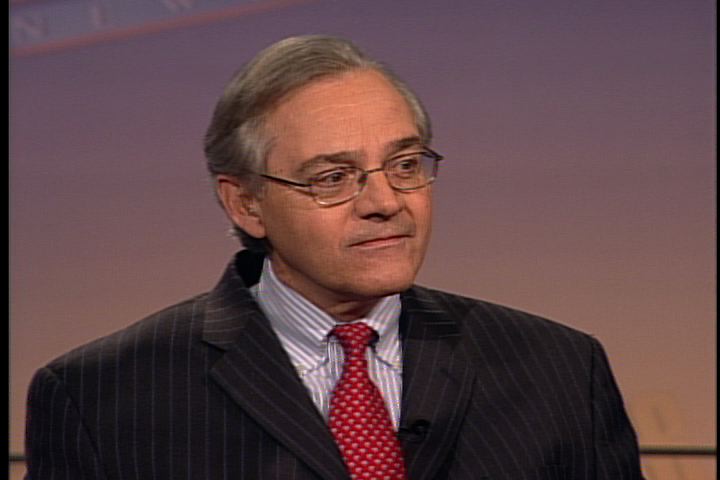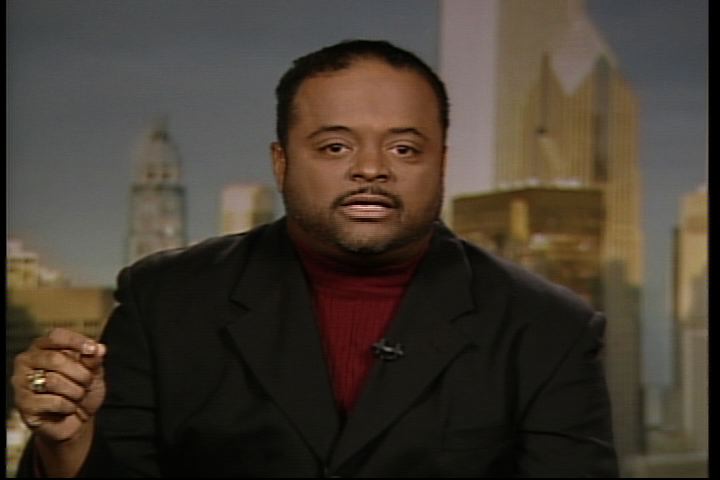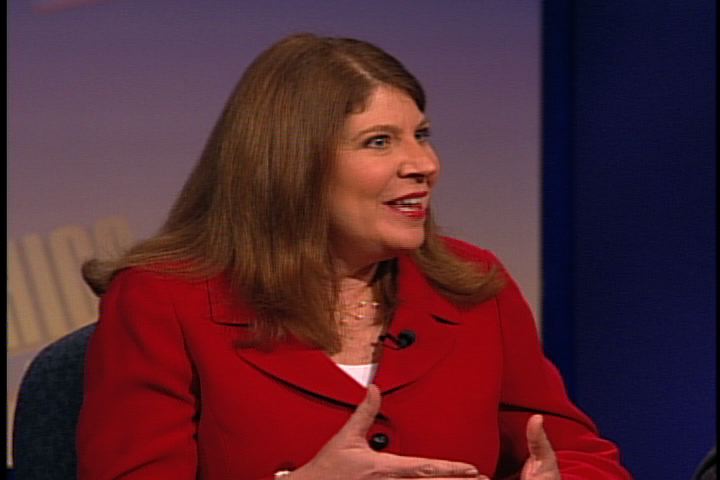In This Episode << SLIDE LEFT TO SEE ADDITIONAL SEGMENTS
Look Back 2008
BOB ABERNETHY, anchor: We look back now at 2008 with the help of Kim Lawton of RELIGION & ETHICS NEWSWEEKLY; Roland Martin, a CNN commentator who joins us from Chicago; and E.J. Dionne, a columnist for The Washington Post and a senior fellow at the Brookings Institution. Welcome to you all.
E.J.DIONNE (Columnist, Washington Post and Senior Fellow, Brookings Institution): Good to be with you.
ABERNETHY: E.J. we had an election in thispast year, and the question is, what are the messages that come to you from the campaign and the vote?
Mr. DIONNE: I don’t think we’ve ever had a campaign that was so rich in messages. The obvious is still the most important. This is a country that began in slavery. African-American slaves came over from Africa at the beginning of the 17th century. We were a racially segregated country less than 50 years ago in parts of our country, and we elected Barack Obama, an African American, indeed somebody whose parents — their biracial family — where their marriage would have been illegal in a lot of states in our country. That’s an extraordinary thing. It wouldn’t have happened without an overwhelming mobilization of the African-American community, and it wouldn’t have happened if he — 60 percent of the votes he got, roughly a little more than that, came from white people. So this is an extraordinary thing in a democracy. I think the other thing — I’ve been playing in my head with the slogan “Change we can believe in.” We focused a lot on change, but there are two other words that are interesting. One is the word “we” and I think there was a sense of a more communitarian country coming out of this election, where he talked a lot about rebuilding community and the country. And “believe” is an important word, not in the religious sense, but in the sense that people wanted more confidence in their government and their political system, and that’s what he promised in this election.
ABERNETHY: And Roland Martin in Chicago, the messages that came through to you, what?
ROLAND MARTIN (CNN Commentator): Sure, I want to pick up on what E.J. just said, because that is a critical point. On November 4, when Obama gave his victory speech, he used the word “we” 47 times. If you study this campaign all throughout from the primary to the general election, whenever you heard Senator Hillary Clinton talk she always said, “What I want to do as president.” Whenever you heard Senator John McCain talk he always said, “What I am going to do as president.” Obama always talked about “we, us, our.” And so that was a challenge, if you will, to America. And I’ve sort of been speaking on this topic for the last couple of months, and I think about Nehemiah and the rebuilding of the wall. He had a vision, but he said the people must agree, and then they said, “let us rebuild.” But the challenge he constantly gave, which I think the American people bought into, was not just what I can do as president, but what we can do as a nation. So the challenge going forward is how the nation is going to respond to their role in responsibility, as opposed to what he is going to do in the White House.
ABERNETHY: And Kim, the messages for you?
KIM LAWTON (Managing Editor, RELIGION & ETHICS NEWSWEEKLY): Well, I was fascinated of course by some of the things these guys have talked about, but also just the incredible role religion played on every front throughout this campaign. You had both parties actively reaching out to people of faith, and frankly for the Democrats, that was a new thing. You hadn’t seen that in quite awhile. You had a Democratic candidate who was religious and comfortable about talking about his faith. But you also had questions about whether a Mormon could be president; you had questions about whether a Southern Baptist pastor should be president; what about a Muslim, and all the, you know, rumors about whether Barack Obama was a Muslim or not. You had questions about evangelicals and are they going to stay with John McCain. Controversial ministers. Every time you turned around religion played a key role, and that was really fun to watch.
Mr. DIONNE: I think that’s a really important point Kim makes. I mean, for Democrats, I’ve joked that Democrats discovered God in the 2004 exit polls. You know, they realized that religious Americans were very important in George Bush’s victories, and I think Barack Obama more than any Democrat in a while really tried to speak directly to religious Americans, including those he knew were going to vote against him. You know, he gave a very powerful speech in ’06. The speech he gave after the Jeremiah Wright controversy had sort of important religious overtones, and so I think we’re going to have a different conversation about religion going forward.
ABERNETHY: Let me ask Roland . . .
Mr.MARTIN: I think one of the reasons for that and let me just touch on that — that is Democrats used to understand the role of religion, and that is, when you study the civil rights movement, that was a religious movement that morphed into a social movement and also touched upon the Democratic Party nationally. The party then got away from that. I think what you’re seeing is — you’re seeing politicians who now recognize that people’s faith is not a part of who they are, but for many it is the essence of who they are, and that is they’re looking at issues today through their faith. They’re looking at climate change; they’re looking at the issue of marriage and abortion; they’re looking at parenting; they’re looking at values — not just simply saying, “Well, this is what I am going to do within the comfort of my home, but this is what I do every single day, no matter whether I’m at work or at home.” That, I think, is something we must watch for, as to how people say faith is now playing a role in every facet of our lives.
ABERNETHY: And meanwhile, E.J., Kim, we had a recession — we have a recession, even a collapse of the financial system. Again, this question of messages — what messages? What does it say?
Mr. DIONNE: Well, you know, when the commandment says “Thou shall not steal,” that’s about our economic life, not just about somebody hitting you over the head, and I think that what we’re seeing here is sort of a new engagement of our ethical responsibilities within the economy, and the other thing is a lot of times within political campaigns you hear the slogan, “We’re all in this together.” I think hard times are moments when we really are all in this together, when there’s much more of that feeling, that we can feel confident being off on our own when times are good and we have a sense of “I can make it myself.” I think in this kind of period, people look to each other a little bit more.
ABERNETHY: But historically there’s been some conflict between different parts of a society when times get tough.
Mr. DIONNE: Oh, that’s true. I mean there can be class warfare, and you’ve seen some of that fighting around the bailouts — I mean the argument that we bailed out the finance industry easily. We are not so easy about bailing out the car industry. Does that mean there are a lot of blue collar workers there? So yes, you’re seeing this kind of conflict in the society. But still, when you look at our history, if you look at the New Deal, that was very much a “we” kind of period. I always think of “It’s a Wonderful Life” as the quintessential New Deal movie, and George Bailey as the figure of that kind of “we.”
Ms. LAWTON: It’s had a real — I just wanted to say briefly — it’s had a real impact practically, though, when you are talking about “we.” Religious institutions are the places people go when times are tough, and a lot of these religious institutions are affected themselves. So at a time when they’re getting more and more requests for help from people they’re, you know, don’t have the same budget. They’re having a hard time keeping their light bills paid. So it has for the religious community very practical effects.
ABERNETHY: And Roland?
Mr. MARTIN: I believe this recession shows how people of faith have failed themselves when it comes to their faith. We have been absolutely horrible stewards of our resources. You know, whenever we talk about Americans being in debt — I mean, we have more debt than we have ever had — ever. And so we’re sitting here buying a houses and cars and we’re taking vacations. Even people in the body of the church doing the exact same thing, and all of the sudden when it all crumbles people then say, “Oh my God, Lord, Jesus, Allah or Buddha” or whatever it is, “oh please, please help me out of this mess” when God is sitting here saying, “Well, you know what, I tried to help you when you were in the middle of it.” I think you are seeing a back-to-basics mentality. You are seeing very few gospel of prosperity folks championing that whole theory. They’re not recognizing that we cannot keep talking about accruing more and more and more without recognizing that our resources are finite.
ABERNETHY: Let me change — we could talk about this all day. Kim, you covered the Episcopalians this year as the year before. Four Episcopal dioceses have now left the Episcopal Church USA.
Ms. LAWTON: Well, the ongoing discussions and struggles over homosexuality, the consecration of a gay bishop, issues of theology continue to, you know, really split not only the US Episcopal Church, but the entire worldwide Anglican Communion that the US Episcopal Church is part of. Big development this year: the conservative groups, some of them entire dioceses that left the Episcopal Church, are trying to form their own rival church body here in the US, so it would still be Anglican. So in other words, it would still be part of the worldwide Anglican Communion, but not part of the US Episcopal Church, and this is really unprecedented for the Anglican Communion if it indeed goes forward.
ABERNETHY: Yeah. Some of us who have experience with Baptist and Methodist and others would say, “Well, what’s so bad about splitting?”
LAWTON: Well, the thing of it is they don’t want to completely split because they still want to be part of the worldwide church, and the worldwide church just isn’t organized that way. I think the other…
ABERNETHY: Can there be two Anglican groups in the United States?
LAWTON: Well, that’s what the conservatives are hoping for, but of course the Episcopalians, the establishment Episcopalians are saying no, we are the expression of Anglicanism in the US. And the other thing is it gets very complicated when you are talking about church property, money, and authority. Who’s in charge? Who answers to whom under this kind of scenario? But that’s what, you know, they’re going to try to work out.
ABERNETHY: A great story in 2008 was what happened in California with Proposition 8 and the aftermath to it. You were covering that, too.
Ms. LAWTON: Well, again, this shows that the issue of homosexuality is roiling not only the church but American society. Gay marriage was briefly legalized in California; then the voters turned that back, and religious conservatives were a key part of that movement. Ironically, a lot of the voters who came out for Barack Obama, who were mobilized by his candidacy, helped defeat gay marriage in California, and that’s really set off a big backlash within the gay community and, you know, a lot of protests.
ABERNETHY: And E. J., the pope came to the United States in this past year and was very well received.
Mr. DIONNE: He was, and that trip was enormously successful in the sense that his approval ratings after that trip were much higher than before. Why was that? I think it’s because he, far more than anyone I think expected him to, devoted the trip to a kind of apology and penance for the pedophilia scandal in the church. He came back to that again and again and again. When you saw the reaction to the trip afterward, I think what you found is more conservative Catholics were a little bit disappointed that he hadn’t taken a harder line. I think more progressive Catholics were relieved that he didn’t take a harder line. But I think he understood how much damage that scandal had caused the church, and he did everything in his power to say I understand that and I want to do something about it.
LAWTON: It was interesting, because he came under the shadow of John Paul II, who was so beloved, and people didn’t really know Benedict or if they did, they didn’t think they liked him very much, and this trip really was a debut for him, and it gave people an opportunity to see him, and so, despite the, you know, some disappointments and whatever, I think that he came away with people really getting a new affection for him.
ABERNETHY: I want to ask you all, if any one of you wants to take on this question, about the ethical lapses in 2008. You know, John Edwards and the governor of Illinois and the governor of New York. Does anyone want to try to explain? Roland, maybe you can try to explain it— why people who are prominent and powerful think they can get away with doing something wrong?
Mr. MARTIN: Because I think what happens is whether you are prominent, whether you are somebody no one frankly knows other than you family — and that is you think about the consequences after you’ve gotten in trouble. And so I sort of remember Michael Irvin when he got in trouble years ago, and he came home, and he was scared to death of what his wife was going to say when he got busted with a couple of women, and she said, “Oh, I’m not your problem.” Sandy said, “That’s between you and God.” And so what happens is people make these decisions not thinking that, “Wait a minute, how can I sit here and talk about my faith and talk what it means to be a godly man and a godly woman and then I go — then I do something completely different than what I’ve been talking about?” And so I think what has to happen is, people have to get back into – and also accountability must come in as well. You know, I think you have to have people around you who are also holding you accountable, accountability partners as well. We’ve gotten away from that. We’ve gotten people around you who are buddies, who go along with you as opposed to saying, “No, we’re going to walk on the straight and narrow together,” because there are too much — you can lose too much, frankly, if you go down this particular path, not just material but also you’re personal integrity, which is difficult to get back.
Mr. DIONNE: Reinhold Niebuhr famously said original sin is the only empirically verifiably doctrine of the Christian Church, and no matter how famous you are, you can fall.
ABERNETHY: Kim, very quickly, Rich Cizik and his resignation as the chief lobbyist in Washington for the National Association of Evangelicals: A lot of people are reading a great deal of significance into that. You want to take that?
LAWTON: Well, it’s part of, I think, the growing discussions that have been going on in the religious right among religious conservatives about what their agenda should be. Richard Cizik is one who had advocated “creation care,” he called it, you know, concern about the environment. He got into trouble most recently for suggesting that he could accept civil unions, not gay marriage, but same-sex benefits for same-sex couples, and that’s another issue, that some evangelicals, especially younger evangelicals, are becoming more tolerant than their parents were. So I think that symbolized some of the greater conversations that are going on about the agenda, and what it should be, and what it should be in the future.
Mr. DIONNE: I thought that was fascinating. Go ahead, Roland.
Mr. MARTIN: Can I say this please? And look, I understand religious conservatives and those who look at the issue of gay marriage from a religious standpoint. But I think where religious people are failing is that they are not articulating on a national level the outrage that we’re seeing when it comes to heterosexual marriage, when it comes to our divorce rate. I mean, if you took the same level of energy that people of faith have towards gay marriage and apply that when it comes to saving marriages or keeping people from entering those marriages that end in divorce, we might see a change there as well.
ABERNETHY: Roland…
Mr. MARTIN: I believe if you are going to attack one, attack the other.
ABERNETHY: Okay, Roland, that’s the last word.
Mr. DIONNE: Amen.
ABERNETHY: Thanks to Roland Martin joining us from Chicago, to Kim Lawton, and to E.J. Dionne.









